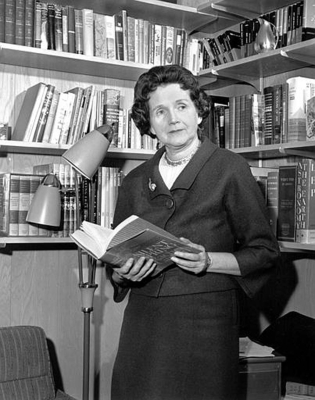
A journalist and nature lover, Olga Owens Huckins wrote two letters – one of which was published in ‘The Boston Herald’ on January 29, 1958 – in quick succession expressing her dismay regarding the usage of DDT as a pesticide. One of these letters prompted American marine biologist, writer, and conservationist Rachel Carson to write Silent Spring, now considered a classic in the environmental sciences.
There is no doubting the fact that we, human beings, have been responsible for more' environmental degradation than any other living species. As we continue our search for longer lifespans and more comfortable living, we seem to be indiscriminately damaging the world around us.b
Despite the knowledge we possess and the awareness of the damage we are causing, there seems to be little collective will to lead to resolute actions on a consistent basis. That said, there have been a number of individuals through the course of history who've made change possible with their doggedness. Olga Owens Huckins and Rachel Carson were two such American women.
Birds drop dead
A journalist and nature lover, Huckins and her husband had created a little bird sanctuary on their property. When the Massachusetts' programme to control mosquitoes sprayed dichlorodiphenyltrichloroethane, or DDT, in their area, Huckins noticed birds and insects too dropping dead in her garden.
As there was little she could do herself about it, Huckins conveyed her anger through a letter that she sent to ‘The Boston Herald.’ This letter, titled 'Evidence of Havoc by DDT’, was published in the newspaper on January 29, 1958.
Seeking to reach out to people in power at Washington who might be able to stop the aerial spraying, Huckins shot off another powerful letter to her old friend Carson. A marine biologist, writer, and conservationist, Carson had spent much of her life studying, observing, and writing about nature. Having already heard about DDT since it was developed in the 1940s as the first of the modern synthetic insecticides, Carson decided to delve deeper into the subject.
Not a miracle substance
DDT was perceived as a miracle substance that could work wonders. It was used with great effect to combat insect-borne diseases such as malaria in many populations. It was sought after by farmers as they saw it as a boon in their fight against pests to save crops.
The more she read about DDT and other insecticides, however, the more convinced she was that the ongoing indiscriminate spraying was untenable. Unable to gain the interest of any magazine to write on the subject with what were then seen as controversial views, Carson decided to go ahead with a book with the wealth of research she possessed. "Knowing what I do, there would be no future peace for me if I kept silent," she said, and decided on the title for her book – Silent Spring.
In her book, which took her four years to complete and was first published in June 1962, Carson spoke about how DDT enters the food chain and gets accumulated in the fatty tissues of animals, including humans, causing cancer and even genetic damage. The success of the book meant that for the first time there was public concern surrounding the improper use of pesticides and the need for better controls around their usage.
Faces personal attack
Just as she had anticipated, there was a barrage of questions that followed, as she was targeted by the chemical industry and by some in the government, with many even attacking her personally. Her meticulous preparation and copious notes put her in good stead, and when she testified before Congress in 1963, she called for new governing policies that protected the health of both humans and the environment.
Even though Carson didn't live to see it (she died in 1964), the U.S. Environmental Protection Agency (EPA) banned the usage of DDT in 1972, based on its adverse environmental impact and potential risk to humans. Even though the dangers of its usage are by now well-established, DDT is still used in some countries, including India, to control mosquitoes that spread malaria. India, in fact, is one of the last countries that still manufactures DDT.
Carson once said that "The aim of science is to discover and illuminate truth." Carson and Huckins definitely did that and also took it to the masses. If there is a lasting legacy of ‘Silent Spring’, it would be the fact that the vulnerability of nature to human intervention was laid bare. And yet, 60 years on, there are many out there who continue to disagree.
Picture Credit : Google




